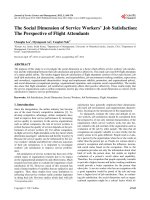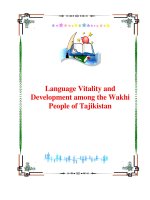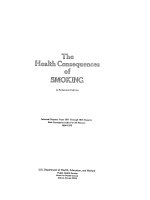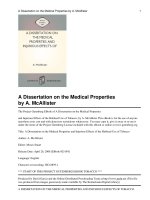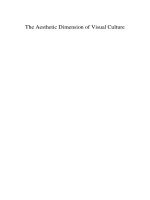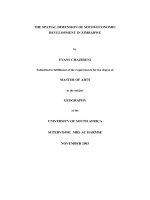THE SYSTEMIC DIMENSION OF GLOBALIZATION pptx
Bạn đang xem bản rút gọn của tài liệu. Xem và tải ngay bản đầy đủ của tài liệu tại đây (8.8 MB, 290 trang )
THE SYSTEMIC DIMENSION
OF GLOBALIZATION
Edited by Piotr Pachura
The Systemic Dimension of Globalization
Edited by Piotr Pachura
Published by InTech
Janeza Trdine 9, 51000 Rijeka, Croatia
Copyright © 2011 InTech
All chapters are Open Access articles distributed under the Creative Commons
Non Commercial Share Alike Attribution 3.0 license, which permits to copy,
distribute, transmit, and adapt the work in any medium, so long as the original
work is properly cited. After this work has been published by InTech, authors
have the right to republish it, in whole or part, in any publication of which they
are the author, and to make other personal use of the work. Any republication,
referencing or personal use of the work must explicitly identify the original source.
Statements and opinions expressed in the chapters are these of the individual contributors
and not necessarily those of the editors or publisher. No responsibility is accepted
for the accuracy of information contained in the published articles. The publisher
assumes no responsibility for any damage or injury to persons or property arising out
of the use of any materials, instructions, methods or ideas contained in the book.
Publishing Process Manager Niksa Mandic
Technical Editor Teodora Smiljanic
Cover Designer Jan Hyrat
Image Copyright Varina and Jay Pate, 2010. Used under license from Shutterstock.com
First published July, 2011
Printed in Croatia
A free online edition of this book is available at www.intechopen.com
Additional hard copies can be obtained from
The Systemic Dimension of Globalization, Edited by Piotr Pachura
p. cm.
ISBN 978-953-307-384-2
free online editions of InTech
Books and Journals can be found at
www.intechopen.com
Contents
Preface IX
Part 1 Globalization and Complex Systems 1
Chapter 1 Sustainability by Interrelating Science, Society
and Economy in Embedded Political Economy
– an Epistemological Approach 3
Masudul Alam Choudhury and Lubna Sarwath Mohammad
Chapter 2 Globalization of Software Development Teams 27
M. Rita Thissen, Susan K. Myers, R. Nathan Sikes,
Jean P. Robinson and Valentina Grouverman
Chapter 3 Bilateral Home Bias: New Perspective, New Findings 51
Crina Pungulescu
Chapter 4 Globalization and Global Innovations 67
Hassan Danaeefard and Tayebeh Abbasi
Part 2 Globalization and Social Systems 81
Chapter 5 Demistifying Globalization and the State:
Preliminary Comments on Re-Commodification,
Institutions and Innovation 83
Hector Cuadra-Montiel
Chapter 6 Media Globalization and the
Debate on Multiculturality 109
Josu Amezaga-Albizu
Chapter 7 Explaining Global Media: A Discourse Approach 125
Ulrika Olausson
Chapter 8 Cultural Globalization and Transnational
Flows of Things American 139
Mel van Elteren
VI Contents
Chapter 9 Recognition of Real-World Activities
from Environmental Sound Cues
to Create Life-Log 163
Mostafa Al Masum Shaikh, Keikichi Hirose and Mitsuru Ishizuka
Part 3 Globalization and Natural Systems 181
Chapter 10 Biodiversity, Ecosystem and
Commodities in Amazonia 183
Peter Mann de Toledo, Ima Célia Guimarães Vieira,
Gilberto Câmara, Roberto Araújo, Andrea Coelho
and Sergio Gomes
Chapter 11 Globalization: Ecological Consequences of
Global-Scale Connectivity in People, Resources,
and Information 201
Debra P.C. Peters
Chapter 12 Brightness and Austerity of the Globalization
Theory: The Ideological Foundations of
Cognitive Capitalism 223
Zlatan Delic
Chapter 13 Tourism: Analysis of a Global Phenomenon
from a Perspective of Sustainability 257
Juan Ignacio Pulido-Fernández and Yaiza López-Sánchez
Preface
Steward Kauffman remarks that the 21
st
century science will head towards ordered
complexity, also in the field of theories concerning social and economic sciences (The
orgins of Order: Self-Organizations and Selection in Evolution, Oxford univ. Press, 1993).
Efforts will be made to attempt to “crystallize” complex systems, that is to transform
them into structures characterized by a high degree of order.
This book The Systemic Dimension of Globalization that consists of a variety of approach-
es and topics was connected throughout the main message - the system conception.
System approach can be counted among most explored theories in the contemporary
science, including social and socio-economic sciences. It seems that such concepts as
catastrophe theory, chaos theory, synergetic theory or fractal theory will constitute a strong
inspiration for research in contemporary global world.
The main common element of these theories is that according to them, systems are
non-linear and unstable complexes. Other characteristics of system thinking is a chang-
ing “routine” of scientific approaches: from reistic thinking to phenomenological thinking
(thing – phenomena); from mechanistic thinking to process thinking; from linear models
to the creation of network models; from scientific metaphor such as “tower” to scientific
metaphor such as “network”.
The genesis of this release results from INTECH mission of interdisciplinarity in scien-
tific publications. Today science is moving in the direction of synthesis of the achieve-
ments of various academic disciplines. The idea to prepare and present a multidimen-
sional and systematic approach to the globalization phenomenon to the international
academic milieu was an ambitious undertaking.
The book The Systemic Dimension of Globalization consists of 14 chapters divided into
three sections: Globalization and Complex systems; Globalization and Social systems; Global-
ization and Natural systems. The Authors of respective chapters represent the great di-
versity of disciplines and methodological approaches as well as a variety of academic
culture. I am convinced that this is the value of this book and I hope that it will be ap-
preciated by a global scholar audience.
X Preface
As editor of this book I would like to express gratitude for the trust was endowed by
the Publisher, but most of all I would like to express my appreciation for the Authors
of all chapters.
June 2011.
Piotr Pachura
Częstochowa
Part 1
Globalization and Complex Systems
1
Sustainability by Interrelating Science, Society
and Economy in Embedded Political Economy –
an Epistemological Approach
Masudul Alam Choudhury
1
and Lubna Sarwath Mohammad
2
1
College of Commerce and Economics, Sultan Qaboos University, Muscat,
Sultanate of Oman and International Chair, Postgraduate Program
in Islamic Economics and Finance, Trisakti University, Jakarta,
2
Faculty of Economics (Islamic Economics and Finance), Trisakti University, Jakarta,
Indonesia
1. Introduction
Sustainability is a far wider concept than in the environment context. Besides, when ecology
is invoked to establish sustainability the concept assumes a wider field of ethical and social
evaluation. Such an evaluative domain involves embedding among a wide field of
interactive subsystems. The systems learn by synergy and unify in the midst of the good
things of life. The learning and choice of the good things of life through the interactive
systemic synergy conveys the essential meaning of ethicality. Systemic learning as an
embedded phenomenon in a unification framework of human ecological setting establishes
the substantive meaning of sustainability (Hawley, 1986). Indeed, the South Commission
(1990, p.13) defines development as such an embedded process in the following words: "To
sum up: development is a process of self-reliant growth, achieved through participation of
the people acting in their own interests as they see them, and under their own control."
Yet the context of learning by synergy is not prevalent in this definition of development. The
process of choice by participating individuals in the light of their own interests could very
well be a ruthless experience in competition and self-interest if not of individuals then of
collusive groups. In the sustainability debate we find such a conflict to be entrenched.
Consider the conflict between global corporation and small enterprises. One complains of
the other for their individual impediments to growth (Barbier, 1986). Yet it is a fact that
enterprises must necessarily survive within the reality of markets, an institutional
regulatory framework, and participatory mechanism (Kim & Mauborgne, 2005). Besides,
there is also the conflict between the present and future generations, whereby the
magnitude of financial and physical resource allocation problem between the present and
future generations remains indeterminate. The savings problem is unresolved in the
intertemporal case (Phelps, 1989).
In fact, there is no participation between the present and far future generation. These two
are not contiguous, and hence cannot co-determine, participate and interrelate. Thereby,
there does not exist a discounting for such indeterminate future preferences and the
resource allocation linked with such out-of-bound resource allocation points beyond
The Systemic Dimension of Globalization
4
overlapping generations (Choudhury, 2011). Consequently, the expressed ethical problem of
intertemporal resource allocation to maximize the associated discounted utilities of future
non-overlapping generations fails in the methodological problem of valuation of a resource
bundle. Only the mystical shade of ethical feeling at the cost of ethical reality prevails
(Inglott, 1990). Neither the South Commission Report nor the Brundtland Report on
sustainable development addresses the intergenerational ethical problem of resource
allocation even though a certain form of collusive participation involving community,
national and social collusion, namely between the North and the South, is emphasized.
Globalization as a result assumes the façade of conflict and individuating transnational
cultural identities (Sklair, 2002).
The theme of sustainability invoked in this paper is premised on the episteme of unity of
knowledge and its impact on unified social reconstruction. This approach involves a
substantive methodology and a specific perspective of application. The research
investigation in the epistemological basis of sustainability by synergistic learning process
involves an endogenous ethical symbiosis. It is extensively embedded in ever-expanding
domains of social activities for the common good of all. We explain below the underlying
methodology as such a complex learning process.
2. Objective
Three principal undertakings comprise the objective of this paper. Firstly, we will establish the
epistemic methodological formal expression for the model of unity of knowledge and the
sustainability criterion under the emergent symbiotic system perspective. The internal
dynamics of the inter-systemic embedded domains in the study of sustainability with
endogenous ethical dynamics between science and society including the global economic
order will be explained in the context of political economy. The idea of political economy in
this context will be explained in terms of the epistemic dynamics of unity of knowledge and its
symbiotic process of systemic learning between social and scientific, hence socio-scientific,
diversity. Secondly, the emergent methodological formalism of sustainability will be
contrasted with other ones of similar types in received literature. This is a deeply
epistemological issue on the theme of selecting the correct premise for unity of knowledge,
thereby defining the unified world-system as a social construction enabled by invoking the
episteme of unity of knowledge. Thirdly, we will apply the emergent sustainability worldview
to the institutional political economy of the Copenhagen Summit on Climatic Change.
3. Explanation of key concepts as the building blocs of the learning model of
sustainability in this paper
This section defines and explains some key terms and concepts that are to be used in the
construction of the generalized system model of unity of knowledge as the episteme and its
application to the theme of sustainability.
Sustainability
In mainstream literature of economic development, sustainability is defined as the growth
and progress of the economy in keeping with non-inflationary economic advancement in
real output. Economic development is also construed as the conveying of the fruits of such
growth for the benefit of labor and enterprise big and small, and the attainment of
environmental preservation and social justice derived from the consumption, production
and distribution of goods and services to all of the present and future generations.
Sustainability by Interrelating Science, Society and
Economy in Embedded Political Economy – an Epistemological Approach
5
In this paper, sustainability is the entirety mentioned above. But the attainment of such a
compendium of wellbeing is not taken in the sense of economic optimization of these
possibilities. Rather, the paper addresses sustainability as learning process established by
organic complementary interrelations between the good things of life. Indeed, such an idea
of complementarities out of choices of the good things of life is the meaning of wellbeing.
We will expand on this idea below.
Ethics
In received literature ethics is understood as humanly driven behavior to attain utilitarian
objectives that may be collectively derived though they exist as individual objectives. The
foundation of such an understanding of ethics is the rational process that emanates distantly
in the metaphysical moral law, but is utterly changed to assume a humanistic character.
In this paper, the meaning of ethics is equivalent to the learning process premised on the
evaluation of an existing degree of unity of knowledge in the examined system of
sustainability. This is then followed by the formalism of social reconstruction to gain the
state of complementarities between the variables representing the good things of life. These
bundles of variables as vectors are like Rawls' primaries (Rawls, 1971). Thus the following
chain of relations prevails in the understanding of ethics in the context of our explanation of
sustainability:
(1)
The meaning of ethics so understood is similar to how Nozick (2001) explains ethics in his
following words (p. 240):
Our actions are mutually connected when my actions are connected with yours and yours
with mine. Frequently, the actions of different people are mutually connected and the
outcomes are nontrivially affected. This is the background that gives rise to ethics.
Episteme
We adopt the meaning of episteme given by Foucault (trans. Scheffler, 1972, p. 191) as
follows:
By episteme we mean the total set of relations that unite, at a given period, the discursive
practices that give rise to epistemological figures, sciences, and possibly formalized systems
The episteme is not a form of knowledge (connaissance) or type of rationality which, crossing
the boundaries of the most varied sciences, manifests the sovereign unity of a subject, a
spirit, or a period; it is the totality of relations that can be discovered, for a given period,
between the sciences when one analyses them at the level of discursive regularities.
The Systemic Dimension of Globalization
6
In a like sense of the concept of episteme in this paper, we mean by episteme the totality of
the ontological and phenomenological precept and formalism premised on the epistemology
of unity of knowledge. This primal concept is followed by its inductive capability out of the
deductive premise. This primal precept of unity of knowledge denotes the episteme. It is
subsequently followed by the entire system of learning experiences in evolving processes of
unity of knowledge. The episteme of unity thereby induces the variables and entities of
sustainability.
Functional ontology and epistemology
Ontology according to Heidegger (trans. Hofstadter, 1988, p. 128; Kant, ) is encapsulated in
this passage:
Transcendental knowledge relates not to objects, not to beings, but to the concepts that
determine the being of beings. ‘A system of such concepts would be called transcendental
philosophy.’ Transcendental philosophy denotes nothing but ontology.
Yet in our paper ontology assumes a functional, i.e. an engineering meaning (Gruber, 1993). In
this perspective, the universe assumes a mathematical form in which symbolization acts as
reflective soul of reality of specific issues and problems, of the nature of the universe that we
want to study as a world-system. The universe and sustainability as continuous learning by
epistemic unity in it across ‘everything’ (Barrow, 1991) is a mathematical semiosis (Heiskala,
2003) of the socio-scientific order. Thus we will use the meaning of functional ontology as
opposed to the metaphysical conception of ontology to mean the formalism of a specific idea.
This is the being of becoming of an idea, which means (functional) ontology in this paper.
According to the functional meaning of ontology, the theory of knowledge (epistemology)
and the ontological principle are made up of two parts that encircle and evolve in the
continuum of knowledge, time, space dimension. These two parts are firstly, the epistemic
derivation of unity of knowledge from a primal premise. Secondly, such an epistemic
knowledge flow develops the concrescence (Whitehead, trans. Griffin & Sherburne, 1978,
pp. 20-30) of the world-system of unified forms representing the ontological formalism of
the socio-scientific order. Sustainability as explained earlier in the domain of organic
complementarities (i.e. participation = organic unity) res extensa is the cause and effect
circularity of the above-mentioned two parts across continuum of systems and over time.
In light of the above definition and explanation of ontology and the ontological principle of
being and becoming, epistemology, the theory of knowledge, and ontology as theory of
functional forms as description of the dynamics of being and becoming of the socio-scientific
universe – its semiosis are juxtaposed. Episteme as totality of the phenomenological
content of meaning emerges from epistemology (idea) and leads to functional ontology; and
(‘and’ this meaning here is taken in the sense of mathematical intersection) ontology leads
into evolutionary epistemology across continuum of systems and knowledge, time and
space dimension. Such is the consequential vintage of sustainability. See below for further
explanation on this dynamics of creativity.
Socio-scientific world-system
The epistemological-ontological delineation of the model emergent from expression (1) is of
the universal and unique type in respect of its possibility for explanation and application to
the widest possible domain of systems, issues, and problems res extensa. (Descartes, trans.
Commins & Linscott, 1954, p. 176). Hence, despite the diversity of problems addressed for
systems under consideration, the meta-model of epistemic unity and sustainability remains
Sustainability by Interrelating Science, Society and
Economy in Embedded Political Economy – an Epistemological Approach
7
invariant. That is because the primal cause, the consequential effect, and the recursive and
evolutionary continuity of the same relations are uniquely premised on knowledge
simultaneously with its induction of variables, entities and events. The totality of such
diversity of systems and events by knowledge induction of a unified order is the idea of the
unified world-system. The fact that such unifying systems span across all domains the
meaning of universality by virtue of the epistemic role of unity of knowledge causes
science, ecology, society and economy to interact, integrate and evolve by organic symbiosis.
The resulting embedding domain is the wider field of social valuation comprising our scope
of political economy.
Political economy
Political economy is a discipline of thought but not the pedagogical study of power and
conflict in states of production, ownership and distribution. These activities together assume
a meaning of systemic concrescence in embedding political economy. The domains of
science, society and economy are now integrated together out of systemic interaction and
the learning spaces of evolutionary epistemological dynamics.
Staniland (1985, p. 33) invokes reference to Lionel Robbins on the concern with the scientific
(epistemological) as opposed to the institutional (pedagogical) approach to the definition of
political economy in the following words: “Lionel Robbins acknowledged that the logical
basis of welfare economics was flawed, that it was impossible to arrive at a scientific
definition of the general good from an examination of individual preferences. But
governments had to make judgments about such matters, and values were inescapably
involved in such judgments. Therefore Robbins proposed dividing the field into ‘political
economy’, which dealt with such important but essentially unscientific matters, and
‘economic science’, which would continue the central, normatively neutral tasks of
analyzing the facts of economic behavior”
The understanding and application of the theme of political economy are different in this
paper. We define political economy in the scientific framework of interaction, integration
and evolutionary epistemology of unity of knowledge caused by the convergence to
unification of ‘everything’ according to the methodology of learning processes res extensa
differentiating truth and falsehood. The scientific universality and uniqueness of this
methodology are preserved while bringing together what in the above quote means
unscientific institutionalism. Scientific formalism of the meaning of institutionalism is fired
by its own dynamics of preferences, structures and creative futures. The resulting symbiotic
worldview is the essential characteristic of our definition of political economy. Within such
a worldview is subsumed the opposing study of conflict and cooperation on the theme of
production, consumption, ownership and distribution of wealth and resources, and all the
opportunities that emerge there from.
On such a systemic spanning perspective of the field of political economy the organic model of
interrelationship between epistemology and development (Koizumi, 1993) can be adopted to
explain our systemic and unification concept of political economy. It integrates ‘everything’
within a modeled framework of human reality partitioned between truth and choices of the
good things of life on the one side; and falsehood and differentiation of life on the other side.
Evolutionary learning process
The meaning of process in the sense of the ontological principle rests on the principle of
being and becoming (Prigogine, 1980). Process breeds sustainability by virtue of the unified
The Systemic Dimension of Globalization
8
nexus of organic relations between diversity. This idea of sustainability and learning process
is represented in expression (1). In this regard, Whitehead (op cit, p. 80) writes: “The
philosophy of organism extends the Cartesian subjectivism by affirming the ‘ontological
principle’ and by contrasting it as the definition of ‘actuality’. This amounts to the
assumption that each actual entity is a locus for the universe.”
The consequence interrelating epistemology and functional ontology along the reproduction
of knowledge and its constructed world-system of unity of knowledge is the essential
meaning of learning. Sustainability is borne by and of itself in continuum of the knowledge,
time, and space dimension. The universe takes its form and reshaping in such a continuity
and systemic continuum of organic forms and their inter-relations.
To configure the study of the learning process and the forms of sustainability and ethics
embedded in it this paper brings out definitive functions inherent in the meaning of
evolutionary epistemology. The idea is emphatically explained by Campbell (1974, pp. 413-
463): “The central requirement becomes an epistemology capable of handling expansions of
knowledge, breakouts from the limits of prior wisdom, scientific discovery.” In our paper such
a permanent characteristic of learning process assumes a universal and unique socio-
scientific construction.
Interaction
Interactions arise from the diversity of organic relations and their immanent forms that
agencies, entities, variables and their relations assume in the study of specific problems,
subject to pervasive inter-organic complementarities. Imbuing interactions with their
legitimacy emanates from the epistemic foundation of unity of knowledge, whereby the
immanent organisms – human and non-human ones – are construed as being pairs of
complements. Yet the idea of pairing is one of unity between the good things of life.
Oppositely, pairing in modes of competition is the permanent characteristic of the domain
of organic competition. Thus a logical contradiction arises from the former kind of unified
worldview and the latter kind of social Darwinism (Darwin, 1985, p. 115).
The meaning of interaction in the sense of sustainability by virtue of the learning process
means the initial recognition of the legitimacy of paired complementarities as the sure sign
of unity of knowledge that is embedded in the systemic domains of diversity. In the social
Darwinian sense the contradictory explanation of interaction is worded as Natural Selection
by way of competition, marginalism, and association among similar organisms that compete
to dominate.
Integration
Integration necessarily breeds as the consequence of interaction. Integration is the process-
determined stage of realized unity of being out of its becoming through the interactive
process. Integration marks order out of diversity of interactions that search for symbiosis.
Integration follows interactions because only discursive, relational and divergent learning
situations can yield to consensual order in the socio-scientific domain, and similarly to
symbiosis in the inanimate domain of 'everything'. Any consensus that precedes interactions
conveys a denial of freedom of participation. Participation is essential in forming a unified
world-system by the episteme of unity of knowledge.
How does integration arise out of a system of interaction? In the social domain the bundle of
interactions denote possibilities of unity of knowledge in respect of particular issues that
altogether interrelate to unify together in forming a mapping of the possibilities onto the
Sustainability by Interrelating Science, Society and
Economy in Embedded Political Economy – an Epistemological Approach
9
unified ensemble (Hubner, 1985). In the physical domain, biological diversities unify
together to form unified bundles of types conforming to specific categories. But central to
such interaction leading to integration is the fact that knowledge remains the be-all and end-
all of the unification process, and hence of the learning process defining sustainability across
the knowledge, time and space dimension of reality.
Consequently, inter-systemic diversity is able to unify in the knowledge-relational sense to
form the organizational structure of the diverse entities that now become unified not by
forms in the primal, but by the basis of knowledge. Two examples are given here:
The unification of the North and South geopolitical world-systems into a unified world
order is the good form of globalization (Behrman, 2003). So-called Darwinian biological
primates converge with human beings in terms of the knowledge organization to share
coexistence of the planet earth. Such a process is different from the type of social Darwinism
of the selfish gene (Dawkin, 1976).
The above-mentioned are examples of sustainability reflected in entities, but not by the
evolution of species by way of competition and replacement of survival of the fittest.
Sustainability here means the knowledge that enables coexistence to participate and to share
in the resources of the planet earth.
The principle of pervasive complementarities is thereby the simulated normative
consequence of improving on all relations of the positivistic nature, either of competition or
coexistence. The endemic social reconstruction in the transformation of unwanted
positivistic situations into simulated normative possibilities of complementarities, hence
unity of being, is a function of knowledge. The episteme of unity of knowledge establishes
the functional ontology of knowledge through the social derivation of knowledge flows.
These knowledge-flows form the laws and preferences of the socio-scientific order at large.
The consequential representations of the resulting world-system are thus knowledge-
induced. These induced entities and relations are now capable of learning further on, as
explained by expression (1). The result is generating sustainability across continuous
learning processes in knowledge, time, and space dimension.
Evolution
Evolution is a function of knowledge-flows causing the bursting of new knowledge-flows
from the previously attained ones through the process of learning in unity of knowledge
across specific experiences. Such experiences occur at specific points of the knowledge, time
and space dimension. Evolutionary epistemology arising from the sequential process of
interaction leading to integration is thereby continuous across continuum of knowledge,
time and space dimension.
We need to ask how evolution arises from (interaction to integration) and cannot arise in
any other juxtaposition. In the knowledge, time and space dimension of the learning world-
system, knowledge precedes the occurrence of event. Hence knowledge in its foundational
epistemic stage, subsequently followed by the simulation of derived knowledge-flows by
means of the discursive mechanism, is firstly a spatial experience. It is then followed by its
evolutionary continuity over time.
The knowledge-formation stage of the learning continuum, hence evolutionary epistemology
in the continuum of space at a point of time marks the interaction-integration dynamics. This
stage of knowledge formation and the simulation process at a given point of time thus
establishes the continuum phenomenology (knowledge-induced transformation at a point of
time). Next the interaction-integration continuum of phenomenology is protracted over time.
The Systemic Dimension of Globalization
10
Sustainability thereafter continues by the joint protraction of (interaction-integration) over
time, forming thus the logical and cognitive forms across continuums of timal continuity.
This phase of continued learning marks emergence of domains of evolutionary
epistemology in the res extensa of systems, entities, variables and relations. On such a
coevolutionary phenomenological experience in continuum and over time, namely, the
representation of the total dynamics over knowledge, time and space dimension pertaining
to the episteme of unity of knowledge and its unification relationship with the world-system
writes Primavesi (2000, p. 110): “… the evolutionary possibility of our interacting peacefully,
fruitfully and happily with other organisms cannot be ruled out”.
The feature of continuous and discrete timal coevolutionary learning processes is found in
Nozick's argumentation (2001, p. 43). But we remove the relativism of truth in Nozick by the
permanence of truth existing as exogenous foundation outside time-space, though truth de
facto relates with time-space events to actualize evolutionary epistemology and forms of the
world-system. In our terms therefore, truth as knowledge of the foundational episteme is
not relativistic. It is the cement in the overarching totality between the derived and
discoursed knowledge-flows and the unifying world-system actualized out of social
transformation.
Thus epistemic knowledge is the exogenous factor of cause in space-time dimension of the
world-system. This is the fundamental origin of sustainability. Without this strong
implication we disagree with Nozick who says, "Our theory places truth within space-time".
Obviously, the meaning of epistemic knowledge is different between the relativistic
knowledge, which to us means temporal knowledge-flows. But such knowledge-flows are
foundationally derived by the combination of absolutist truth based on text and history of
the good things of life, and the discourse of the enlightened society. Braudel (1995) referred
to this kind of worldview as the consciousness of history of the long dure. Now in regards to
expression (1), sustainability takes a multidimensional meaning. It involves in it res extensa
the socially converged structures of science, society, and economy; hence of the embedding
political economy as the coordinated unified, interactive, integrative and evolutionary
system that we have pronounced.
In the coevolutionary phase of the learning process there is no binding prediction for the
evolutionary processes to be definitely truth-knowledge directed. It is possible that
contradictory scenarios of evolutionary epistemology can emerge and continue, or they can
revert again to the socially constructed path of change. An example is that of the absolutist
episteme of unity of knowledge (truth) disintegrating into Darwinian evolutionary
processes (Popper, 1988), and then again reverting to the autopoiesis of Gaia, which refers to
“the dynamics, self-producing and self-maintaining network of production processes within
live organisms” (Primavesi, p. 2).
A note needs to be made on the nature of absolutism contra relativism in the truth-knowledge
amalgam. Unlike the many speculative philosophers of all times, in our paper there is no
relativism of truth and the epistemic knowledge. We make the argument that, if this was the
case then the world and reality would descend into an endless spiral of void and nothingness.
There is no basis; everything remains relative, changeable, and hence unfounded. Now to
emanate two streams of truths from disparate epistemic origins means the reign of perpetual
competition, marginalism and differentiation of existence. In this kind of reality there cannot
prevail coexistence, coordination, unity and sustainability. Unfortunately, such a competing
and marginalizing dichotomous worldview is the basis of all of western science of nature and
society. The resulting political economy then is seen as the study of conflict and competition
Sustainability by Interrelating Science, Society and
Economy in Embedded Political Economy – an Epistemological Approach
11
between unsustainable opposed groups that oppositely claim power over the production,
consumption, distribution and ownership of wealth.
Contrary to the idea of relativism of truth, the absolutism of the unitary episteme means
irreducibility of certain laws and the socio-scientific implements derived there from by a
regressive method of argumentation and belief. Such a truth that is solely premised on the
episteme and functional nature of the precept of oneness is absolutely inexorable,
implacable. Socio-scientific sustainability now becomes uniquely and universally attainable
by means of the extension of unity across nexus of cohering systems res extensa.
In the end, there is no relativism of truth. At the epistemic level the identity of topological
mappings causes Truth > Epistemic Knowledge of Oneness > Truth, in the sense of
equivalence of relations denoted by >.
1
Wellbeing
Unlike utility and welfare functions, which are neoclassical concepts of optimum economic
objective criteria for the individual and household, and community and government,
1
If possible, let
1
and
2
be two origins of relative truths, if possible. Then
1
2
= . Consequently,
by the topological property of each and all the mappings (Maddox, 1970), {f
i
}, i=1,2, ,n; the domains of
these mappings denoted by {x
s
}(x
q
} = , plus their functional relations taken in bundles have the
property, {f
p
(x
s
)}(f
r
(x
q
)} = ; with i, p, q, r, s with assigned numbering either over finite, infinite,
discrete or real sets. Hence truths and their consequences over entities, variables, relations and domains
remain differentiated. No interaction is possible. Hence integration through the interactive learning
process and evolutionary epistemology is impossible. Consequently, ethics and causal
interrelationships remain impossible. There is no embedding as of science, society and economy within
political economy. Sustainability is permanently denied to such a differentiated system.
Contrarily, if
1
and
2
are relational, then say,
1
2
. In the denumerable case of all
numbered topological mappings of variables as mentioned above, it is possible to find an associated
non-zero and non-identity scalar factor , such that
1
2
= .I , with I as the identity set.
Consequently,
1
and
2
are only near relational inverses of each other with a convergence towards ,
but with an -scalar margin of identity.
The conclusion is that with
1
and
2
as disparate knowledge, both of them are encompassed by the
law (topology) of . Therefore, Truth. Besides, Truth is epistemic Knowledge because it has
functional essence displayed by the topological mappings emanating from and routing through
1
and
2
. Thus, Truth Knowledge. But Truth Knowledge . Thereby . Hence, self-
references. Likewise, the epistemic Truth Knowledge self-references (Choudhury & Zaman, 2009).
This is the temporal consequence of sustainability as the learning process over continuum and in
continuity of the knowledge, time and space dimension. The topological subsets in this sustainability
concept is the embedding of science, society, economy in political economy with its relational power of
ethicality gained by learning, i.e. interaction, integration and coevolutionary epistemic unity.
The special case is that of the metaphysical ontology of 'being' in unity as Truth equivalent to
Knowledge, when =0. That is error in relative relationalism is zero. Then
1
2
= . We now term
1
and
2
as Truth and Falsehood, respectively. Thereby, Truth and Falsehood or Relative Truths become
perfectly disjoint.
In the end altogether, sustainability is attainable at a margin of deflection (error) in our mundane
experience; sustainability as the perfection of Truth and Knowledge in the epistemic sense remains
optimally attained. Consequently, the world-system established on the basis of the epistemic unity of
being and becoming does not stand on the relativity of truth. In the mundane sense only, as in the case
of science, society, economy embedding in political economy, evolutionary knowledge is simulated by
discursive learning on the premise of the epistemic unity and its unified social reconstructions.
The Systemic Dimension of Globalization
12
wellbeing is a simulative objective criterion function. It conceptualizes and measures the
degree to which organic complementarities, reflecting unity of knowledge in the systemic
organic relations between the good things exist, or simulative social reconstructions can be
improvised.
The social welfare function of welfare economics is defined as a mathematical mapping
from the domain of socially selected states to their outcome in the social space. Such a
functional map has the following mathematical properties to make it viable for analytical
work (Quirk and Saposnik, 1968, pp. 105-108): Social choices comprise vector-bundles X
1
and X
2
, such that either X
1
is preferred to X
2
or vice-versa, or these are indifferent to one
another at the individual level. These directions of social choices at the individual level are
mapped on to the social level while the axioms of economic rationality are preserved. That is
preferences remain unchanged along the mapping from the individual to the social level.
Transitivity of preferences over bundles of goods (variables) in rational choice at the
individual level is preserved at the social level as well.
Social welfare function involving the preservation of the properties of the mapping from the
individual to the social level needs a dictator to impose attainment of social welfare level by
a given set of social choices. Irrelevant preferences hold for a subset of society, where a
truncated form of the welfare function can be extended to the whole of society (Hammond,
1987). It is equally possible to replicate the social welfare function in terms of bundles of
social choices, e.g. economic growth, distributive justice, employment and price stability, or
in terms of individual utility functions in terms of these variables individually chosen. They
are then aggregated socially.
Thus, the principal rationality property of individual utility function and its effect on private
choices to make up aggregated order-preserving social choices, namely by means of the
postulate of marginal substitution and exogenous preferences and ethical implication,
remain in tact both at the individual and social levels. This is the idea of pervasive
substitution and marginalism, scarcity of resources, economic rationality in choices, non-
dynamic preferences and full information (or bounded rationality as in Simon (1957)).
Consequently, the idea of sustainability in the sense of social embedding of interacting,
integrating and creatively evolutionary systems is never prevalent in mainstream
conception and applications of science, society and economics.
On the other hand, wellbeing function is a mapping from the social space of states with
endogenous ethical induction of the variables on to the space of social outcome as measured
by the degree of complementarities between the social choices of the good things of life as
they are represented in the social variables with ethical induction. In the social wellbeing
space ethics is parametrically estimable for which simulation possibilities exist to arrive at
better social reconstructions.
A social wellbeing function does not stand alone. It is there for purposes of evaluation of the
prevalent state that can lead into simulated states of social reconstruction. Hence the social
wellbeing function is estimated and simulated with respect to a system of circular causation
interrelations between the variables, all of which are endogenously ethically induced.
There is no substitution between the variables and functional inputs (e.g. consumer utility
indexes) in the wellbeing function, as it is otherwise found in the case of the welfare
function. The implication of these two properties is this: There is permanent substitution
between social choices in the welfare function; and pervasive complementarities or social
reconstruction of social choices in the wellbeing function. Sustainability explained by the
embedding of science, society and economy in the social political economy by way of
Sustainability by Interrelating Science, Society and
Economy in Embedded Political Economy – an Epistemological Approach
13
continuous learning process in unity of knowledge as the episteme is never a possibility in
the order of substitution between possibilities. Possibilities are always to be complemented
for augmenting knowledge-flows and their material inductions as ethically-induced
resources for human development and reproduction of resources, rather all kinds of
resources for life-sustenance.
With the continuous augmentation of resource as the result of the growth of knowledge-
flows and their induction of social variables into evolutionary discovery of possibilities, the
contrary core postulate of scarcity in received economic theory, or Darwinian conception of
biology and anthropology, and optimization concepts of scientific theories are all replaced
by the theory of coevolutionary symbiosis. A theory for this kind of dynamics is uniquely
and universally explained by the Interaction-Integration-Evolutionary (IIE) phases of the
learning processes, as explained earlier.
While the problem of sustainability is seen in the eyes of scarcity in the case of mainstream
common understanding by science, society and economics (Coombs, 1990; Martinez-Alier,
1987), scarcity is abandoned in a logical way in the sustainability concept of complementary
learning processes (Daly et al, 1992). The postulate of diminishing marginal returns to scale
of received economic and social theory does not exist in the knowledge-induced learning
space and its model of organic unity of knowledge (Romer, 1986). Yet coexistence is the
possibility, unlike the evolutionary process models of Darwinian type of social choice
(Myrdal, 1987) and science (Hull, 1988).
Indeed, knowledge for participation and sharing is power. When knowledge-flows continue
under this epistemic framework of induced possibilities, the latter artifacts become the
bastion of rediscovered resources ad-infinitum. Now the wellbeing function becomes
exclusively an objective criterion of learning processes and interactive-integrative-
evolutionary (IIE) systems premised on epistemic unity of knowledge.
Therefore, pervasive complementarities are inherent in the systemic interrelations between
the variables chosen to describe the wellbeing function. The feedback relations that emanate
from the estimation followed by the simulation of the wellbeing function in terms of the
interrelations between the variables that are pervasively complementary to each other form
a system of circular causation relations.
The system of circular causation relations are used for dual purpose. Firstly, they are
estimated by using positivistic data from the 'as is' state of the sustainability problem under
examination. The unity dynamics of being and becoming towards attaining a semblance of
social reconstruction of a unified world-system requires coefficients to be simulated into
better values to exhibit inter-variable complementarities. This simulated change in the
coefficients convey the idea of social reconstruction or social simulation from a positivistic
order of 'as is' reality into a normative aspired transformation for an 'ought-to-be' better
world of sustainability. The latter world-system is gained by unity of knowledge induced in
its unity of the problem under study. In such a context, the social political economy takes its
meaning of embedding between the synergies of science, society and economy (Choudhury,
2003, 2007). The conformable meanings of systemic globalism and globalization follow. See
later.
Social (re-) construction
The empirical and applied part of the theory of unity of knowledge on the issues and
problems of the world-system res extensa is established by the estimation followed by
simulation of the wellbeing function, subject to the system of circular causation relations.
